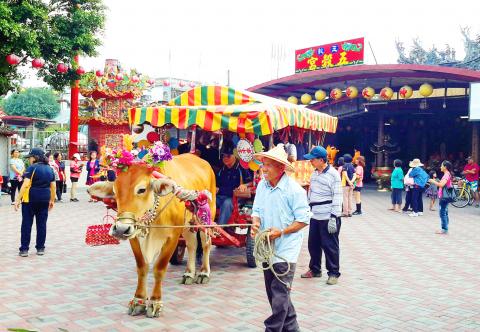Makatao villages in Pingtung County concluded their annual Night Festival yesterday, as local government officials joined the Makatao Aboriginal community to review cultural revitalization policies and other government programs outlined for the community over the coming years.
The festival, which took place this weekend at Laopi Village (老埤) in Pingtung County’s Neipu Township (內埔), is one of the three main annual cultural events of the county’s Makatao people, who are one of 10 Pingpu, or lowlands, Aboriginal groups in Taiwan still not officially recognized by the government.
“We had over 300 Pingpu clan relatives and friends, mostly from southern Taiwan, coming in to attend this festival,” Laopi Village Elder Pan An-chuan (潘安全) said. “It is an important occasion for us to get together, to thank the deities who provided guidance, protection and a good harvest this year, and also to celebrate our cultural heritage.”

Photo: CNA
Pan said the traditional worship rituals and activities were centered on the village’s Laotsu Temple, where gatherers pay respects to Makatao deities through offerings of pork, grains, rice wine, betel nuts and fruits, as well as by performing a special dance known as Tioh-hi.
The dance is performed by women from the Makatao community and led by female shamans.
A key supporter of the revitalization of Makatao traditional festivals is Pingtung County Cultural Affairs Department Director Wu Chin-fa (吳錦發), who has pushed for financial backing for such programs.
“Household registration data from 1909, during the Japanese colonial era, show that Laopi Village had 1,186 residents listed as ‘plains Aborigines,’” Wu said in a speech at the festival.
“This was a vibrant Makatao community and a cultural center in the county,” he said. “It has remained so up to this day, but work is needed to preserve and pass on the heritage of the community by Makatao elders, community leaders and cultural researchers.”
Wu said that since Pingtung County Commissioner Pan Men-an (潘孟安) took office in 2014, programs for Makatao cultural revitalization have been among the county’s priorities, along with funding for local schools to teach students about the history and heritage of Makatao people.
Pan Yen-pao (潘燕寶), who heads local Makatao culture working groups, said that this year’s event included an exhibition of old photographs and documents about the Makatao community that showed people’s activities through the generations, along with a presentation of traditional local arts and crafts.
“The event is a good way to educate young people about the traditions and customs of the Makatao community. It is important for people to recognize their own cultural heritage and identify themselves as Makatao people,” he said.
Wu and community elders at the event also invited people to participate in two other upcoming Makatao festivals in Pingtung, the Ganabo Night Festival in Gaoshu Township (高樹), which will be held overnight from Jan. 1 to Jan. 2, and the Gabulong Night Festival in Wanluan Township (萬巒), which is scheduled for March 2.

Alain Robert, known as the "French Spider-Man," praised Alex Honnold as exceptionally well-prepared after the US climber completed a free solo ascent of Taipei 101 yesterday. Robert said Honnold's ascent of the 508m-tall skyscraper in just more than one-and-a-half hours without using safety ropes or equipment was a remarkable achievement. "This is my life," he said in an interview conducted in French, adding that he liked the feeling of being "on the edge of danger." The 63-year-old Frenchman climbed Taipei 101 using ropes in December 2004, taking about four hours to reach the top. On a one-to-10 scale of difficulty, Robert said Taipei 101

Nipah virus infection is to be officially listed as a category 5 notifiable infectious disease in Taiwan in March, while clinical treatment guidelines are being formulated, the Centers for Disease Control (CDC) said yesterday. With Nipah infections being reported in other countries and considering its relatively high fatality rate, the centers on Jan. 16 announced that it would be listed as a notifiable infectious disease to bolster the nation’s systematic early warning system and increase public awareness, the CDC said. Bangladesh reported four fatal cases last year in separate districts, with three linked to raw date palm sap consumption, CDC Epidemic Intelligence

Two Taiwanese prosecutors were questioned by Chinese security personnel at their hotel during a trip to China’s Henan Province this month, the Mainland Affairs Council (MAC) said yesterday. The officers had personal information on the prosecutors, including “when they were assigned to their posts, their work locations and job titles,” MAC Deputy Minister and spokesman Liang Wen-chieh (梁文傑) said. On top of asking about their agencies and positions, the officers also questioned the prosecutors about the Cross-Strait Joint Crime-Fighting and Judicial Mutual Assistance Agreement, a pact that serves as the framework for Taiwan-China cooperation on combating crime and providing judicial assistance, Liang

US climber Alex Honnold left Taiwan this morning a day after completing a free-solo ascent of Taipei 101, a feat that drew cheers from onlookers and gained widespread international attention. Honnold yesterday scaled the 101-story skyscraper without a rope or safety harness. The climb — the highest urban free-solo ascent ever attempted — took just more than 90 minutes and was streamed live on Netflix. It was covered by major international news outlets including CNN, the New York Times, the Guardian and the Wall Street Journal. As Honnold prepared to leave Taiwan today, he attracted a crowd when he and his wife, Sanni,